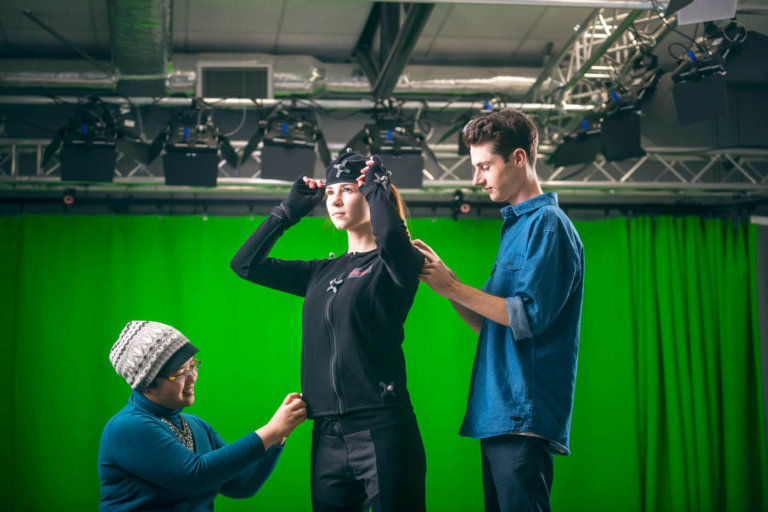
Some of the most exciting developments in design and technology are happening at the edge of the world in New Zealand. With a series of incubators, accelerator programmes and supportive government initiatives, Wellington has emerged as an innovative tech hub. It’s small and agile, which makes it much easier to get ideas across different industries within a couple of weeks.
Rebecca Hand thrived on the innovative mana and professional connections that Wellington has to offer by studying the Master of Design Technology (MDT) at Wellington ICT Graduate School. This postgraduate programme is delivered by Victoria University of Wellington at the Miramar Creative Centre which is located among the Weta group buildings — the firm founded by Peter Jackson with many Academy Awards, BAFTAs, and Emmys under its belt. The Wellington ICT Graduate School is a Victoria University of Wellington initiative to help kick-start people into the thriving industry, providing hands-on experience and real-world projects along with professional development.
The MDT is an intensive programme that brings education and industry together to teach visual effects (VFX), animation, 3D motion graphics, and post-production for those wanting to get into creative industries like film or even game design. According to Hand, guest lectures were common, as were opportunities to visit the mocap (motion capture) stage at Weta Digital and see the virtual production environment for a scene from the movie ‘Alita: Battle Angel’. Lecturers were “genuinely excited” with deep industry connections and even more impressive resumes — featuring Disney and DreamWorks Animation stints — were a daily inspiration for Hand.

Source: Wellington ICT Graduate School
They helped her transition from student to professional, landing a coveted position at Weta Digital. “A few of the guests from Weta Digital that I connected with during the course supported me when I ended up at Weta Digital myself,” she said.
Her current job scope as an Assistant Technical Director at Weta Digital demands a wide range of skills, which Hand is grateful her degree prepared her for. “The master’s helped give me a variety of experiences in up-to-date industry standard software and gave me a glimpse into what a post-production pipeline could look like.”
Rebecca’s story mirrors the typical growth and evolution of a Wellington ICT Graduate School student. Practical and industry-focused, the institution does more than just provide an impersonal paper qualification to land a job. Like Hand’s experience shows, it’s a journey with a lot of pastoral care, professional development and caring lecturers with deep connections to industry.
The MDT runs for 12 months (starting in March) and is open to those with an undergraduate degree and some basic understanding of 3D computer graphics applications or time-based media.
Camden Wright, 23, had previously completed a Bachelor of Design Innovation specialising in Media Design at Victoria University of Wellington. He amassed a wide set of skills, from VR to wearable tech and motion capture, but recruiters found his skillset too broad. Looking to become more competitive, he enrolled in the MDT.

Source: Wellington ICT Graduate School
It’s a decision that paid off handsomely. Today, Wright is an Assistant Technical Director at Weta Digital. Before landing this dream role, he managed to score a coveted internship at SideFX in Canada. SideFX is the creator of the industry-leading 3D animation software Houdini which the programme has a partnership with.
Looking back, Wright wished he had taken all the courses offered as part of the master’s as “each one was an in-depth class on the critical skill sets needed in the industry.”
“Every course I took gave me valuable skills that I use on a daily basis, it’s hard to pick a favourite. The Capstone where we created a short film was the biggest highlight, I learned more through that production than any class I had taken before. Creative Coding, in hindsight, was the most impactful on my career so far, it introduced me to Houdini and a new way of procedurally creating content,” he said.
There were even pretty left-field outings — like photogrammetry sessions, movie nights and zoo trips — as professional development training. Yet, the anatomy/biomechanical studies, film knowledge, and camera experience are all relevant to understanding the broad pipeline in the VFX industry, Wright explained.
Another benefit? Making more friends. “They brought us closer which set us up well for an industry that relies on personal connections to find work and also to ensure you end up in a work environment you enjoy,” Wright said.

Source: Wellington ICT Graduate School
It takes talent to inspire future generations of industry-ready tech professionals — ask Hand and Wright and they will tell you the MDT has plenty of accomplished figures as lecturers and mentors. They brought more than just a thorough understanding of how to translate industry needs to students — they did so with a genuine enthusiasm for both the learning materials and projects produced by students.
“When trying to break into the industry as a junior this support was very encouraging. On top of being fantastic teachers, they also went above and beyond to showcase our capabilities and connect us with companies and people in the industry,” Wright added.
This then leads to more connections with guest lecturers and mentors, resulting in more opportunities. Wright and Hand met many of their colleagues today even before their first day at work, i.e. via the MDT. “Several of these connections have given chances for me to promote my portfolio and have even led to work opportunities at industry-leading companies,” he said.
Want to create a direct pathway from university to the world’s most sought-after high-tech firms? Book an advice session here. To check out work Master of Design Technology students have created, click here.
Follow Wellington ICT Graduate School on Facebook, Twitter, LinkedIn, YouTube, Instagram and Medium
Liked this? Then you’ll love these…
Wellington ICT Graduate School: Thrive in the booming tech industry
Behind the Lens: Film schools that capture students’ creative potential







